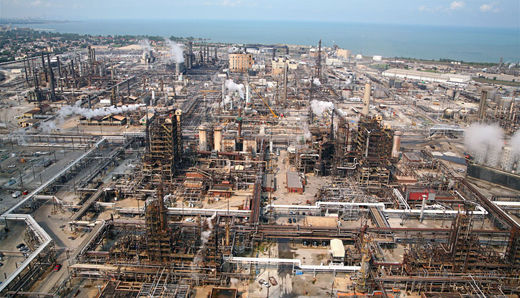
The Environmental Protection Agency has taken on oil giant BP along with corporate-friendly Republican officials in the state of Indiana.
Last year, Indiana issued an air quality permit giving BP a green light to avoid clean air requirements in a major expansion of its Whiting oil refinery, just downwind from Chicago.
The Bush-era EPA approved that permit, saying that the added emissions into the air would not be enough to require declaring the plant expansion a “major modification.” Under federal regulations, when an existing plant makes a “major modification,” it must install additional, potentially costly, pollution control devices or take other steps to reduce emissions and meet Clean Air Act requirements.
In other words, the Bush EPA cooperated with Indiana’s GOP Gov. Mitch Daniels, a former Bush budget director, in letting BP off the hook.
Now, the Obama EPA has given Indiana 90 days to do a new air emission analysis of BP’s $3.8 billion expansion plans and submit a revised permit. The review could result in the agency declaring the project a “major modification,” which would mean BP would have to beef up air pollution controls for the project.
The massive Whiting refinery, on the shores on Lake Michigan about 20 miles southeast of downtown Chicago, is already deemed one of the largest sources of air pollution in the heavily populated Chicago/Northwest Indiana area.
Five environmental groups – the Environmental Law & Policy Center, Hoosier Environmental Council, Natural Resources Defense Council, Save the Dunes Council, and Sierra Club – had petitioned the EPA in August 2008 to review the original permit. These groups are calling the agency’s new decision a victory for area residents, particularly those who live near the refinery.
“EPA recognizes what we’ve been telling BP and the state all along – this refinery expansion is clearly going to dump additional pollution on the surrounding communities, and the law requires BP to control it,” Ann Alexander, senior attorney for the Natural Resources Defense Council, said in a statement. “BP has been playing games with the numbers to try to duck that responsibility, but the jig is up.”
The EPA asked Indiana officials to re-examine, among other emission sources, the pollutants released by the project’s flares, which are tall chimney-like structures that burn off waste substances. It also asked the Indiana Department of Environmental Management to analyze emissions from a variety of new equipment the refinery will use in its new role as a top processor of dirty crude oil from Canadian tar sands.
The NRDC says the expansion would increase numerous traditional air pollutants like sulfur dioxide, nitrogen oxides, and particulate matter. In addition, it would create “approximately as much new global warming pollution as a new 300-400 megawatt coal plant, about a 40 percent increase from current refinery levels.”
The refinery is the sixth-largest source of industrial air pollution in the Chicago area, according to the Chicago Tribune. In 2007, the most recent year for which figures were available, it spewed out 246 tons of airborne chemicals and heavy metals, including toxic benzene, ammonia and mercury.
In the last two years, the Tribune reports, the EPA has cited BP several times for violating the Clean Air Act. The company has admitted that for the last six years it violated limits on emissions of benzene, a chemical linked to leukemia and other health problems.
Hoosier Environmental Council Executive Director Jesse Kharbanda acknowledged the importance of economic development for the hard-hit region, but said it can’t outweigh the health of the area’s residents.
“In a struggling economy, Indiana is right to be focused on jobs and economic development, but that growth has to be well-balanced with reducing the harm of noxious air to kids and others vulnerable to air pollution,” Kharbanda said. “EPA’s decision is a very positive step in ensuring that Hoosiers in Northwest Indiana share in both economic development and improved environmental quality.”
Photo: BP’s mammoth Whiting refinery. (geosci.uchicago.edu/~moyer/GEOS24705/)












Comments